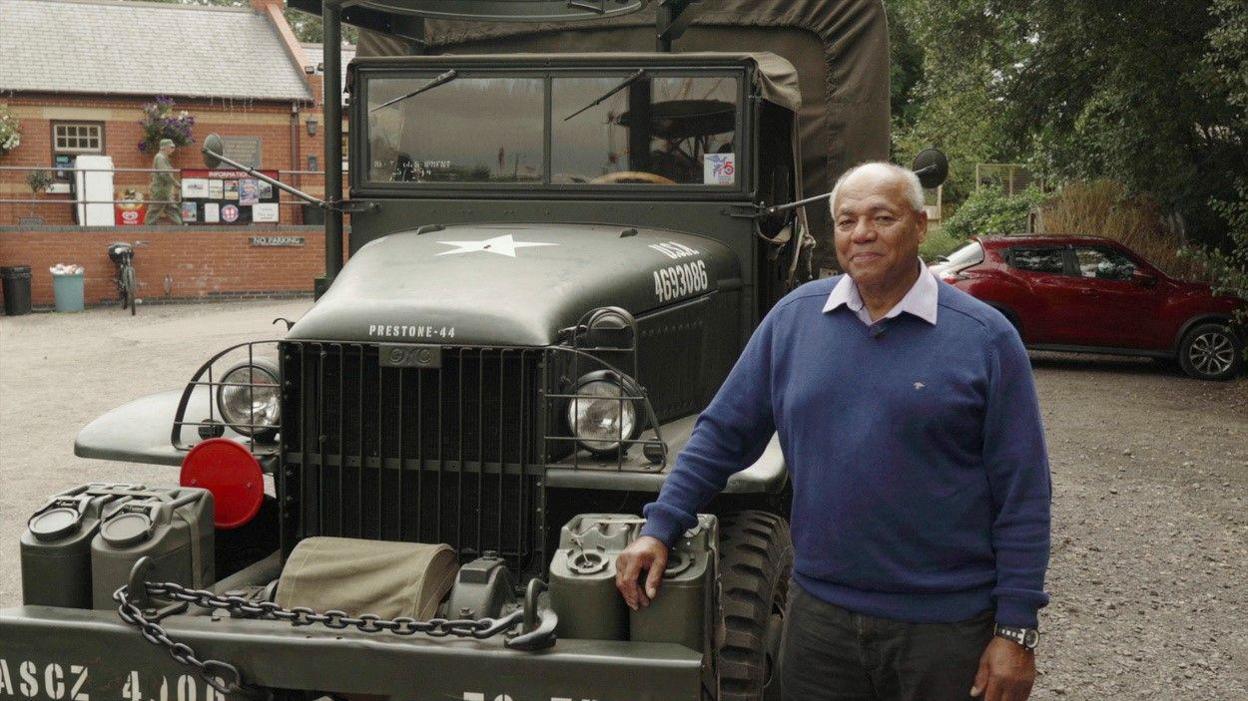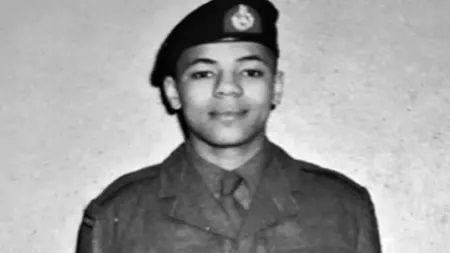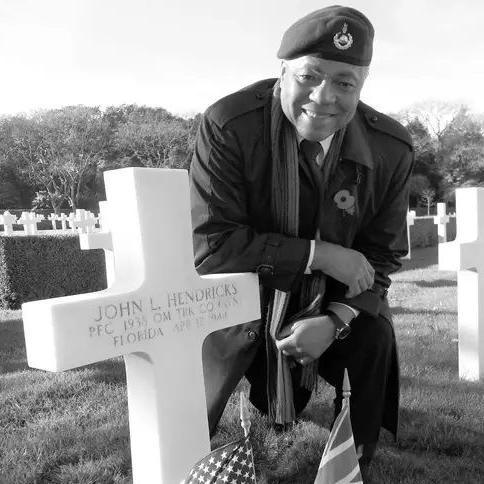'Tracking down my GI dad's grave was amazing'

Terry Harrison was one of about 2,000 so-called "brown babies" born during World War Two
- Published
A man's quest to trace his African-American father has been told in a new documentary.
Terry Harrison, from Leicester, is one of an estimated 2,000 so-called "brown babies" born to black American fathers and British mothers during World War Two.
The documentary Terry's GI Dad follows his journey to South Carolina in an emotional bid to trace his father and learn about the lives of African-American soldiers based in Britain during the war.
He described uncovering his father's real identity and being reunited with his two half-sisters as an "amazing experience".
The film, which also takes Mr Harrison to Washington DC and the beaches of Normandy in northern France, premieres on Wednesday at the University of Leicester.
Mr Harrison was born in 1944 after his mother met one of the 250,000 or so African-American soldiers serving in the US military, who was based in the village of Gaddesby, near Melton Mowbray in Leicestershire.
Although Mr Harrison, 80, never knew his GI dad, he pursued a military career as a Royal Marines Commando.

Mr Harrison went into military service himself
But not knowing who his real father was left a void in his life and he set out to discover more about his roots.
He said: "There were very few people of colour at the time so it was quite unusual.
"I had a fantastic mother who stood her ground. Mum could have given me and my sister away for adoption.
"But as I grew a little bit older, I wanted to know more about my dad. I began to feel different."
After the death of Mr Harrison's mother in 1985, he learned - from her possessions - about a man named John Hendricks.
He said: "When I saw this, I thought wow."
Dr Liam McCarthy, from the University of Leicester - who met Mr Harrison in the 1980s and learned of his story about a decade ago - said: "Terry wrote to the American military and asked for details of him and back came a folder."
In this was a letter from Mr Harrison's mother asking about Mr Hendricks's death.
The military said Mr Hendricks had been killed during a traffic stop in Britain, by white American soldiers, when he was driving a truck.
Court martial documents showed the white soldier who shot and killed him was exonerated.

Mr Harrison spent years visiting the grave of African-American serviceman John L Hendricks
But Mr Harrison had a DNA test during the film, which revealed his father was not who his mother had believed.
Mr Harrison instead traced his family to another soldier who had been stationed in Leicestershire - Staff Sgt Vander Lee Ellis, from South Carolina - and has managed to reunite with his half-sisters.
He said: "I went to see my dad's grave and when I arrived there, I was greeted by two sisters. It was an amazing experience."
Mr Harrison's story is just one of the tales told by the children of African-American soldiers left behind after the war, many of whom never found their fathers.
Dr McCarthy said: "Black lives clearly didn't matter at the time. The US army was segregated until 1948 into white units and black units.
"But when they came to Britain, they weren't segregated. They were very polite and that endeared them to the British public.
"They had friendships, they had romantic liaisons with white British women, and Terry is one of about 2,000 babies born to black soldiers and white British women.
"They call themselves brown babies and they're very proud of the name."
Terry's GI Dad will be shown at 17:30 GMT at the Attenborough Building at the University of Leicester, as part of Black History Month.
Get in touch
Tell us which stories we should cover in Leicester
Follow BBC Leicester on Facebook, external, on X, external, or on Instagram, external. Send your story ideas to eastmidsnews@bbc.co.uk, external or via WhatsApp, external on 0808 100 2210.